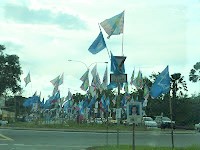Back in our village on Harrington Road, the greatest fear in my parents' mind was a child falling ill in the middle of the night. At that time, there were no telephones to call a taxi, no emergency hotline, and certainly no ambulance service. When illness struck unexpectedly, one had to act fast. In such desperate moments, hesitation could mean the difference between life and death.
 If a child suddenly began crying in the night and a quick touch to the forehead revealed a burning fever, action had to be taken immediately. I vividly remember one such night when one of my brothers became seriously ill. My father, flashlight in hand, rushed frantically around the house, flipping through piles of old boxes and newspapers - not to find medicine, but cockroaches.
If a child suddenly began crying in the night and a quick touch to the forehead revealed a burning fever, action had to be taken immediately. I vividly remember one such night when one of my brothers became seriously ill. My father, flashlight in hand, rushed frantically around the house, flipping through piles of old boxes and newspapers - not to find medicine, but cockroaches. Once the insect was caught, he would carefully extract its dung pouch, mix it with some Chinese medicinal ingredients, and prepare the concoction for the sick child. My parents firmly believed that this traditional remedy could treat high fevers caused by fright (驚嚇). I never questioned the origin of the formula - it was most likely an age-old remedy handed down through generations."
Interestingly, cockroaches do have a place in traditional Chinese medicine. Still when I think about it now, I shudder at the memory. The idea of ingesting part of a cockroach - a creature notorious for thriving in filth and spreading disease - makes me recoil. Yuck!
***************************************************
Back then, bananas trees grew in front of my village house. Whenever a bunch of bananas ripened, my father would chop down the whole tree for harvesting. I clearly remember an incident that happened when I was about seven years old. After one such harvest, we kids each plucked a large bananas leaf and began waving them around like the head of a unicorn, pretending to perform a lion dance.
Suddenly, I felt a sharp, needle-like pain in one of my fingers. Within minutes, I became dizzy and stumbled back to the house to lie down. My father noticing my sudden disappearance, rushed back inside to check on me. By then, the finger had started to swell, and he immediately suspected I'd been bitten by an insect. He return to the spot to investigate and eventually found the culprit - a spider. Needless to say, the unfortunate creature was swiftly killed.
For my treatment, my father firmly slapped the bitten area several times, then squeezed it hard to force out the venom. After that, he applied a type of Chinese medicated oil specifically used for treating insect bite. Thankfully, I recovered.
*************************************************
I recall another incident that happened when I was about six years old. I was running near the chicken coop when I tripped and fell. As I hit the ground, my hand landed on a rusty nail, which pierced about 10mm into the flesh just above my palm.
Fortunately, it was a Sunday and my father was at home. As was his usual remedy, he struck the injured area hard to force the blood to flow out, presumably to flush out any contaminant. Then, in a rather unconventional treatment, He applied a piece of Chinese mushroom soaked in urine to the wound.
Somehow, I recovered without developing tetanus. Whether that outcome was due to this unique treatment or simply luck, I'll never know.
***************************************************
The saying "A mother would do anything for the well-being of her child" certainly applied to my mother. My eldest brother suffered from occasional seizures from a young age, which my mother believed were the result of prolonged high fever he had experienced earlier in childhood. Throughout his growing years, she tirelessly sought out all kinds of treatment in the hope of finding a cure.
At one time, on the suggestion of my maternal grandmother, my mother sought the help of a bomoh (traditional healer), arranged through her Muslim relatives in Kampong Darau. I still remember the day the bomoh came to our house. He prayed over a small pebble and dropped it into a bottle filled with plain water, instructing my brother to drink only from that bottle. The water was to be replenished whenever it ran low. He also suggested my brother's name be changed from Ah Tet to Ah Nyee, believing it might help with the healing. Unfortunately, none of this succeeded in curing his condition.
Later, my mother turned to a woman from the True Jesus Church in Kota Kinabalu, who was known for her prayer of deliverance for those suffering from illness. She visited our home several times to pray for my brother and eventually suggested our entire family convert and transfer church membership to ensure full deliverance. My mother, desperate and hopeful, was ready to make the change - until someone advised her, at the very last moment, against it.
Desperate times can push even the most rational among us to try anything - no matter how unorthodox - in the hope of relief. My mother was no exception. Her actions, though sometimes unconventional were always rooted in love.






















